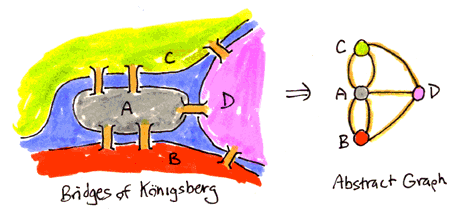


This page is
www.math.columbia.edu/~bayer/F00/combinatorics.html

Combinatorics is the study of finite structures, and arises in all
parts of mathematics. It is a crucial tool in computer science,
because computers by their very nature manipulate finite structures.
This honors-level introductory course is aimed at potential math and computer
science majors, and provides an alternative to Calculus for those
wishing to take a liberal arts elective in mathematics.
Topics will include the pigeon-hole
principle, counting techniques, permutations and combinations, Polya
counting, binomial coefficients, inclusion-exclusion principle,
generating functions and recurrence relations, and combinatortial
structures (matchings, designs, graphs).
Text:
Introductory Combinatorics by Richard A. Brualdi. Third edition, 1999.
Prentice Hall,
Upper Saddle River, New Jersey 07458. ISBN 0131814885.
Columbia University Bookstore,
or check
AddALL to find the best price online.
Exams: There will be two exams (30 points each) and a final (40 points).
- First Exam, Thursday, October 5, in class.
- Second Exam, Thursday, November 9, in class.
- Final, Thursday, December 21, 1:10pm-4:00pm.
These dates do not coincide with any religious holiday which causes suspension of
New York City's alternate side parking regulations; see
NYC Parking Calendar.
See also bnaibrith.org/caln.html.
Please discuss other conflicts with me well in advance of the exam in question.
Master University Examination Schedule
2000-2001 University Academic Calendar
 Course materials: Course materials are posted in Acrobat PDF format. Your browser
can be trained to automatically open these files with Acrobat Reader, a free program which you can
download from http://www.adobe.com/products/acrobat/readermain.html.
Course materials: Course materials are posted in Acrobat PDF format. Your browser
can be trained to automatically open these files with Acrobat Reader, a free program which you can
download from http://www.adobe.com/products/acrobat/readermain.html.
Class Schedule and Homework Assignments:
- Tuesday, September 5:
- Thursday, September 7:
- Tuesday, September 12:
- Thursday, September 14:
- Tuesday, September 19:
- Thursday, September 21:
- Tuesday, September 26:
- Thursday, September 28:
- Tuesday, October 3:
- Thursday, October 5: First exam
- Tuesday, October 10:
- Thursday, October 12:
- Tuesday, October 17:
- Thursday, October 19:
- Tuesday, October 24:
- Thursday, October 26:
- Tuesday, October 31:
- Thursday, November 2:
- Tuesday, November 7: no class; Election Day
- Thursday, November 9: Second exam
- Tuesday, November 14:
- Thursday, November 16:
- Tuesday, November 21:
- Thursday, November 23: no class; Thanksgiving
- Tuesday, November 28:
- Thursday, November 30:
- Tuesday, December 5:
- Thursday, December 7:
- Thursday, December 21: Final Exam, 1:10pm-4:00pm




 Course materials: Course materials are posted in Acrobat PDF format. Your browser
can be trained to automatically open these files with Acrobat Reader, a free program which you can
download from http://www.adobe.com/products/acrobat/readermain.html.
Course materials: Course materials are posted in Acrobat PDF format. Your browser
can be trained to automatically open these files with Acrobat Reader, a free program which you can
download from http://www.adobe.com/products/acrobat/readermain.html.